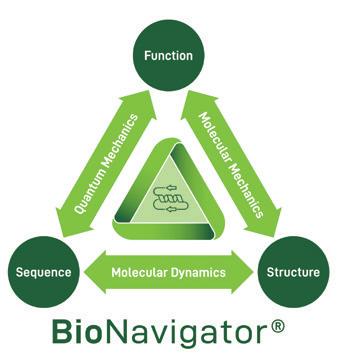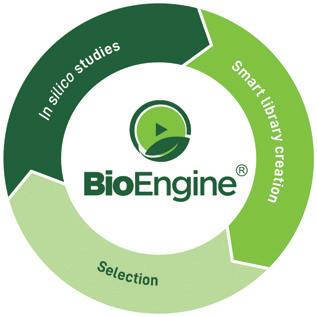
3 minute read
Enzymicals AG
Name ›
Address/P.O. Box › Postal Code/City › Country › Contact Person › Telephone › Fax › Email › Website › Social Media › Number of Employees › Founded (year) ›
Areas of Activity ›
Biological Patents ›
External ›
Collaborations Enzymaster Deutschland GmbH
Neusser Straße 39 40219 Düsseldorf Germany Dr Thomas Daussmann +49-211-158-216-10 +49-211-158-216-12 info@enzymaster.de https://enzymaster.de/
I Q
206 2013
| Biocatalysis Research | Enzyme Panel Screening | Enzyme Engineering: Computer-Aided Directed Evolution of Enzymes | General and Customised Enzyme Screening Kits | Immobilisation of Enzymes | Reaction Process and DSP Development | Fermentative Enzyme Preparation and Formulation | Biocatalytic Manufacturing of Fine Chemicals, Intermediates, APIs, and other Compounds (Lab to Industrial Scale)
Comprehensive international patent portfolio mainly in the field of novel engineered enzymes
| JingJing Pharmaceutical Co., Ltd. | Haig Barrett, Inc.
Background Enzymaster
Enzymaster provides a one-stop solution for the development and commercialisation of innovative and sustainable enzyme catalysis technologies. With our proprietary BioEngine® and BioNavigator® platforms as well as our long-term experience, we offer R&D services combined with the establishment of complete technology transfer packages and manufacturing collaborations to fine chemical, pharmaceutical, and other industries. Our portfolio includes enzyme identification, enzyme panel screening, smart enzyme engineering, process development, enzyme preparation by fermentation, and biocatalytic manufacturing. Enzymaster Deutschland GmbH, a subsidiary of Enzymaster (Ningbo) Bio-Engineering Co. Ltd., is your reliable partner in the international market for enzyme applications and products manufactured by biocatalytic processes.
Enzymaster strives to contribute to a greener environment and improve manufacturing processes by helping organisations leverage the benefits of biocatalysts, decreasing dependence on toxic and often inefficient, purely chemical syntheses. Flexible fee-for-service models moving in lockstep with R&D programmes, high success rates, commitment to confidentiality, and the avoidance of one-size-fits-all IP policies allow Enzymaster to advance biocatalysis innovation rather than impede it, ultimately fuelling the future of manufacturing. Green Magic Happens Here!



BioEngine®
Enzymaster has developed BioEngine®, a proprietary directed evolution platform with integrated computational enzyme engineering. The implementation of computational hot spot identification, in silico enzyme library screening, and in silico recombination into the directed evolution cycle allows us to shift most of the screening efforts from the laboratory into the computer and cover a large sequence space of the target enzyme, all while accounting for the real chemical process conditions. Based on the computational results, we construct smart, focused, and small libraries of enzyme variants, which can conveniently be screened via HPLC or GC to characterise a comprehensive range of desired properties for these variants. This enables us to reach the desired biocatalytic process target in typically only 3-6 rounds of combined in silico and experimental directed evolution. Therefore, BioEngine® can significantly speed up the process of bringing your idea to the market.
BioNavigator®
The BioNavigator® platform is part of BioEngine® and has been developed by Enzymaster as a proprietary in-house computational toolbox for sequence- and structure-guided combinatorial library design and enhanced diversity generation. BioNavigator® is a set of state-of-the-art methods for computational enzyme identification, in silico activity and selectivity prediction, and stability calculation under process conditions. This includes bioinformatics-driven hot spot identification, focused combinatorial library design, and in silico loop design. Artificial intelligence (AI) and structure-based recombination algorithms are applied to in silico prescreening to enhance the combinatorial sequence diversity coverage beyond traditional random and sitesaturation mutagenesis approaches, thereby increasing the sequence space coverage and identifying all important sequence areas for fast and efficient enzyme engineering.










